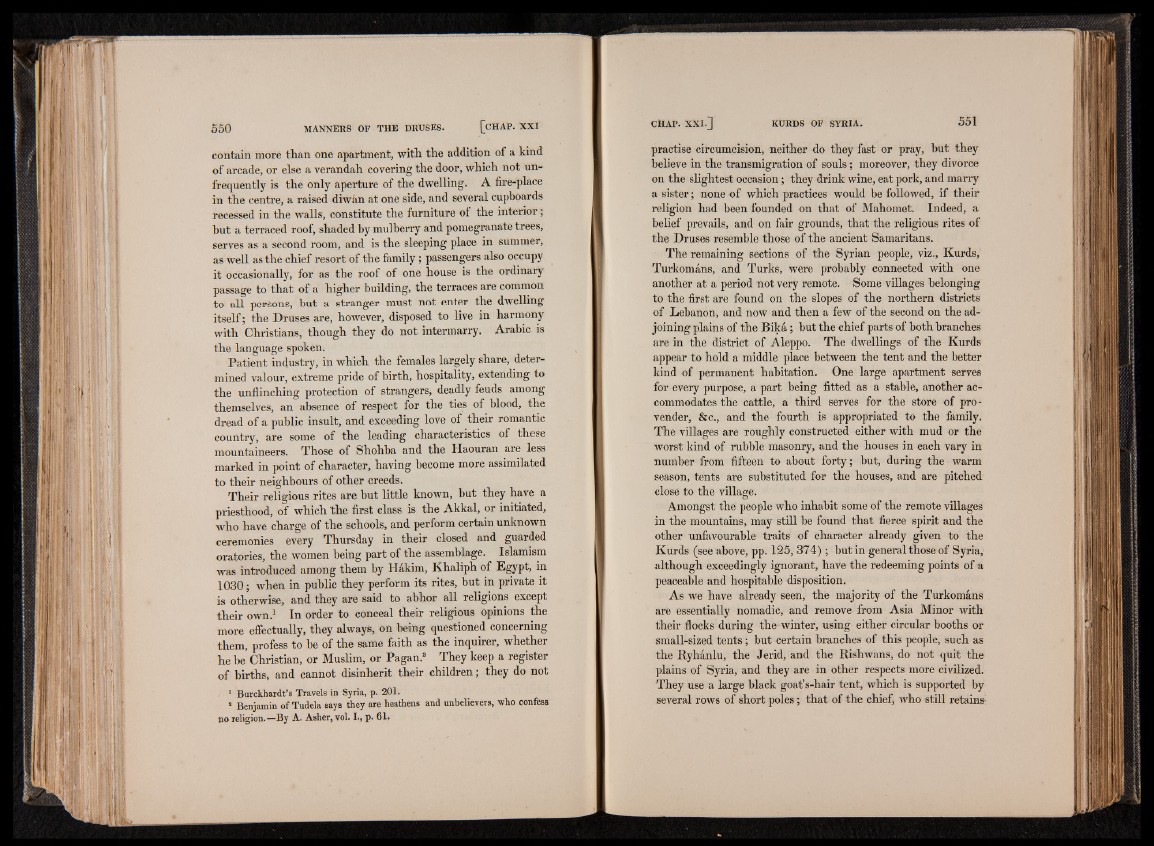
contain more than one apartment, with the addition of a kind
of arcade, or else a verandah covering the door, which not un-
frequently is the only aperture of the dwelling. A fire-place
in the centre, a raised diwan at one side, and several cupboards
recessed in the walls, constitute the furniture of the interior;
but a terraced roof, shaded by mulberry and pomegranate trees,
serves as a second room, and is the sleeping place in summer,
as well as the chief resort of the family; passengers also occupy
it occasionally, for as the roof of one house is the ordinary
passage to that of a higher building, the terraces are common
to all persons, but a stranger must not enter the dwelling
itself; the Druses are, however, disposed to live in harmony
Avith Christians, though they do not intermarry. Arabic is
the language spoken.
Patient industry, in which the females largely share, determined
valour, extreme pride of birth, hospitality, extending to
the unflinching protection of strangers, deadly feuds among
themselves, an absence of respect for the ties of blood, the
dread of a public insult, and exceeding love of their romantic
country, are some of the leading characteristics of these
mountaineers. Those of Shohba and the Haouran are less
marked in point of character, having become more assimilated
to their neighbours of other creeds.
Their religious rites are but little known, but they have a
priesthood, of which "the first class is the Akkal, or initiated,
who have charge of the schools, and perform certain unknown
ceremonies every Thursday in their closed and guarded
oratories, the women being part of the assemblage. Islamism
was introduced among them by Hakim, Khaliph of Egypt, in
1030; when in public they perform its rites, but in private it
is otherwise, and they are said to abhor all religions except
their own.1 In order to conceal their religious opinions the
more effectually, they always, on being questioned concerning
them, profess to be of the same faith as the inquirer, whether
he be Christian, or Muslim, or Pagan.2 They keep a register
of births, and cannot disinherit their children; they do not
1 Burckhardt’s Travels in Syria, p. 201.
8 Benjamin of Tudela says they are heathens and unbelievers, who confess
no religion.—By A. Asher, vol. I., p. 61.
practise circumcision, neither do they fast or pray, but they
believe in the transmigration of souls; moreover, they divorce
on the slightest occasion; they drink wine, eat pork, and marry
a sister; none of which practices would be followed, if their
religion had been founded on that of Mahomet. Indeed, a
belief prevails, and on fair grounds, that the religious rites of
the Druses resemble those of the ancient Samaritans.
The remaining sections of the Syrian people, viz., Kurds,
Turkomans, and Turks, were probably connected with one
another at a period not very remote. Some villages belonging
to the first are found on the slopes of the northern districts
of Lebanon, and now and then a few of the second on the adjoining
plains of the B ika; but the chief parts of both branches
are in the district of Aleppo. The dwellings of the Kurds
appear to hold a middle place between the tent and the better
kind of permanent habitation. One large apartment serves
for every purpose, a part being fitted as a stable, another accommodates
the cattle, a third serves for the store of provender,
&c., and the fourth is appropriated to the family.
The villages are roughly constructed either with mud or the
worst kind of rubble masonry, and the houses in each vary in
number from fifteen to about forty; but, during the warm
season, tents are substituted for the houses, and are pitched
close to the village.
Amongst the people who inhabit some of the remote villages
in the mountains, may still be found that fierce spirit and the
other unfavourable traits of character already given to the
Kurds (see above, pp. 125, 374); but in general those of Syria,
although exceedingly ignorant, have the redeeming points of a
peaceable and hospitable disposition.
As we have already seen, the majority of the Turkomans
are essentially nomadic, and remove from Asia Minor with
their flocks during the" winter, using either circular booths or
small-sized tents; but certain branches of this people, such as
the Ryhanlu, the Jerid, and the Rishwans, do not quit the
plains of Syria, and they are in other respects more civilized.
They use a large black goat’s-hair tent, which is supported by
several rows of short poles; that of the chief, Avho still retains: